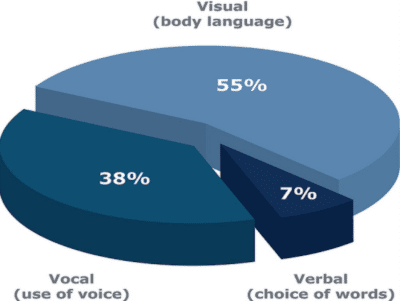Communicating effectively
Verbal and Non-Verbal Communication is a Minefield. Tread carefully and consider all aspects of it.

It doesn’t matter what you say. You have to go to a meeting, one-on-one, it’s important for your future career, start-up plan, whatever. And up to a point it doesn’t matter what you say. Because by the time you sit down, take a deep breath and start talking – you’ve already said so much the other person has more than enough information to make a decision.
Do you know how long it takes someone to make decisions about you, after meeting you for the first time? Guess, how many seconds.
Three.
Within three seconds they will already have made decisions about your trustworthiness, your intelligence, your status, your levels of confidence or aggression, and much more. That’s what In Real Life really looks like.
The other person is basing all this on how you move, how you dress, your facial expressions and even, amazingly, your smell. We smell fear and uncertainty.
Humans can detect some compounds at so few molecules it’s the equivalent of a single drop of water in 20,000 Olympic-sized swimming pools.
But I Haven’t Said Anything!
Notice that at this point you haven’t actually opened your mouth and said anything at all. That whole thought is so deeply scary isn’t it? It feels like jumping into the sea with a small wound bleeding on your leg. And there are sharks nearby, you just know it. Welcome to the wonderful world of human communication.
We’re way beyond a WhatsApp chat, an emoji or a few words you’ve used your thumbs to create. But this is the sea you have to swim in, there’s no hiding. So jump in and realise it can be the most amazing place and a lot of the sharks are surprisingly friendly.
The 55%
So, how you carry yourself shows how you feel. Think about that. You can dress right – please do, for whatever the occasion – but the outside is a big signpost of what’s going on inside. Think about all the things you can tell about these people:
1. They eat messily, fast and noisily, not looking up much.
2. If male, they sit with legs apart, staring at you the whole conversation.
3. They keep fidgeting when they’re sitting talking to you.
4. In conversation their voice is deep, they smile, their movements are slow.
5. They talk over you, don’t listen, fold their arms, lots of dismissive facial gestures.
There are hundreds of things to infer in the above list and you’ve probably got many of them, but taking the main thing:
1. Nervous
2. Aggressive, which often hides lack of confidence
3. Insecure, lacking confidence
4. Calm, confident, we like them
5. Overly assertive and arrogant. Again, often hiding insecurity.
Notice how so much boils down to lack of confidence in themselves. Who doesn’t lack confidence? We all do to a degree. But the body follows the mind and the mind follows the body. So we can make the body say the right things and that will affect the mind. Simple huh? But simple is not easy.
If you’re a bit anxious about speaking to someone or public speaking, that anxiety lives and echoes in your head. So get out of your head. I used to have to interview famous, powerful people. It made me anxious beforehand. My way out was to simply focus on them. They liked that, and I relaxed as I was so focused on them and not on me.
Work on your body language. Think about your breathing. Breathe deep and slow and realise how much tension that releases. Other people will pick up on your slow breathwork and will like it subconsciously.
Keep movements slow and keep them minimal. Sit comfortably and don’t fidget. Your mind can make your body obey, and now your mind is getting good signals from the body, and you’re getting more oxygen from the better breathing, and you’re now thinking faster and better and it’s going well.
The 38%
You have the voice you have, but you can do a lot with it. For example, a simple and very effective trick when you’re on just audio, like the phone or a group meet without video, is to smile when you talk. We hear the smile every time, and it has a huge effect, whatever it is you might be saying. Don’t smile like a lunatic all the time but smile often. It works.
When you’re relaxed, whatever your gender, your voice will deepen slightly and the reverse is also true. We respond better to deeper voices, even in women, so try to relax your vocal chords, which means you’re getting your breathing under control too.
Speak slower. I find speaking as if the other person doesn’t have a total command of English one of the best ways to communicate. I’m thinking of them, speaking a bit slower, keeping it slightly simpler in language and construction. Which leads us to the 7%.
The 7%
Yeah, just 7% of communication depends on the actual words that you speak. That’s a weird thought isn’t it? So make those words count. Online written material works best in terms of interaction when aimed at the level of a 14-year-old. Don’t talk down but talk steady and don’t use jargon or technical terms to say something you could say more directly.
Again, the more you can think about your audience – even of one – the more relaxing you can find it and the more you will be tailoring your words to the actual person in front of you. They’ll appreciate what you’re doing, even subconsciously.
The 100%
Try it. Look at yourself in the mirror. Talk to that person. How do they look, how do they sound, what can you tell about them? Try some variations of tone, posture, words. You absolutely have to get better at this. And if you think you’re already great then rest assured that other people won’t think so.
One famous entrepreneur, James Altucher, worried he wasn’t very good at talking to people, to investors, to clients. So he went along to some open-mic nights at a comedy store and tried some stand up. Sometimes it went okay, sometimes he died and the audience made sure there was no resuscitation. But he learned a lot and got better. Now, I’m not suggesting you do that – hands up, I wouldn’t have the nerve – but you get the point.
Push yourself out of your comfort zone as that’s the only way to make progress, to learn. And surprisingly soon you’ll find people smiling when they listen to you, responding positively, and you’ll feel absolutely great as you start to convince people to do what it is you need them to do.
Just go in 100%.
Written in partnership with Graham Scott - an award author, publisher and staff writer who has been writing professionally for four decades.
Leadership starts with communication. And ends with communication. How do you cmmunicate?



